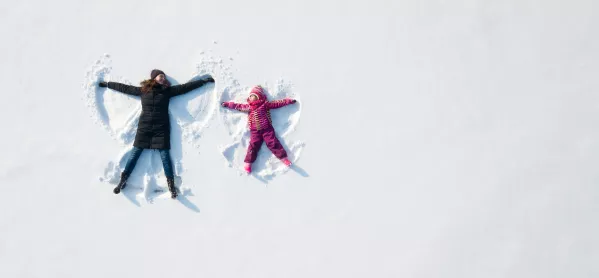5 ways to keep snow days in the home learning age

Many children and educators have lamented the apparent end of the much-loved “snow day” since Zoom, Webex and Teams - with their grand promises of continuing the school experience despite Covid lockdowns - fully entered the education lexicon in March 2020.
However, all hope is not lost. Snow provides a beautiful outdoor classroom of wonder, and a little creative thinking can bring out some engaging and exciting learning possibilities.
On a day when weather forecasts are predicting snow across swathes of Scotland tomorrow, here are just a few ideas to maximise snow day learning opportunities across the curriculum:
Related: Why we cannot let Covid-19 spell the end of snow days
Snow business: ‘S’no day like a snow day’
Snow fair: Coronavirus should mean the end of snow days forever
Snow time: Watch how snow days make headteachers sing
Quick read: 11 reasons why snow gives teachers the shivers
1. Stem activities
Stem learning lends itself very well to snow. During the “Beast from the East”, I tweeted my class some instructions on how to build an igloo. I then built my own, sent them the photo and challenged them to do the same. If there’s plenty of snow, igloo building is also an excellent teamwork activity for young and old. Siblings, neighbours and friends can all get involved.
For younger children, valuable activities could be snowman building, designing a snowy obstacle course, trying experiments and learning about water, ice and volume, or artistic activities with food colouring.
2. Writing
A beautiful, snowy setting can be used as writing stimuli at all ages and stages. Children could write their spelling sounds and words in the snow. They could go out for a walk and come up with vocabulary to describe what they experienced with their five senses. Rich vocabulary such as “crunching”, “glistening”, and “luminous” could be introduced. Pupils could write a story in a snowy setting or a diary entry about all the fun they had during their snow day.
The children could ideally focus on collecting fun experiences, and do the writing when they get back to school.
3. Reading
Snow can be a fun way to increase reading engagement with a snow photo challenge. Can children send a photo of themselves doing some unusual snow day reading? Suggestions could be to read to a snowman, read inside an igloo, read while making snow angels or even share a cosy indoor reading photo.
4. Health and wellbeing
Snow days are an excellent opportunity to remind children of ways to improve their health and wellbeing. Mindful walking can be fun in the snow. Instruct children to focus on the senses. Can they notice something they hear, see, feel and smell? Can they go for a family walk for exercise, fresh air and daylight (something important during the darkest months of the year)? Can they simply relax and recharge?
5. Citizenship
Sudden school closures can be an ideal opportunity to have young people learn and think about citizenship. Can they clear a path for a neighbour or help them with shopping (which in turn provides opportunities for maths and working with money)? Is their neighbourhood fully accessible to all during bad weather or are some people trapped after a heavy snowfall? Is the local council doing enough to help? Maybe the children could write persuasive letters to their MPs or local councillor about this.
There are a host of learning opportunities that can be gleaned from snow days, and these should be held in parity of esteem with the online classrooms that we developed during Covid.
We all know the benefits of outdoor learning and how much more children learn when they are active and having fun - and I am optimistic that the next generation will have the same magical childhood memories of snow days that we all treasure.
Gemma Clark is a primary teacher and a master’s student based in Scotland. She tweets @Gemma_clark14
You need a Tes subscription to read this article
Subscribe now to read this article and get other subscriber-only content:
- Unlimited access to all Tes magazine content
- Exclusive subscriber-only stories
- Award-winning email newsletters
Already a subscriber? Log in
You need a subscription to read this article
Subscribe now to read this article and get other subscriber-only content, including:
- Unlimited access to all Tes magazine content
- Exclusive subscriber-only stories
- Award-winning email newsletters
topics in this article



